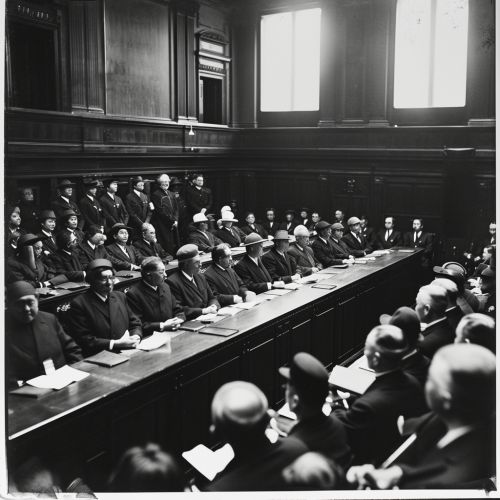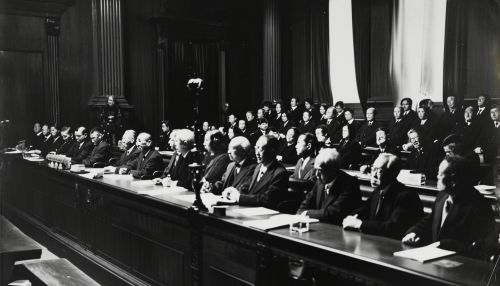Tokyo Trials
Overview
The Tokyo Trials, officially known as the International Military Tribunal for the Far East (IMTFE), were a series of military tribunals held by the Allied forces after World War II. These trials were convened to prosecute leaders of the Empire of Japan for Class A war crimes, Class B war crimes, and Class C war crimes. The trials took place in Tokyo, Japan, from May 3, 1946, to November 12, 1948.


Background
The idea for an international tribunal to prosecute Japanese war criminals was first proposed by President Franklin D. Roosevelt in 1943. The concept was further developed at the Yalta and Potsdam conferences, where the Allied leaders agreed to establish an international military tribunal similar to the Nuremberg Trials in Germany.
Establishment of the Tribunal
The IMTFE was established by a charter issued by General Douglas MacArthur, the Supreme Commander for the Allied Powers (SCAP) in Japan. The charter, known as the IMTFE Charter, was largely based on the Nuremberg Charter, which had established the framework for the Nuremberg Trials.
Composition of the Tribunal
The Tribunal was composed of eleven judges from eleven of the Allied nations: Australia, Canada, China, France, India, the Netherlands, New Zealand, the Philippines, the Soviet Union, the United Kingdom, and the United States. The presidency of the Tribunal was held by Sir William Webb of Australia.
Prosecution and Defense
The prosecution team was an international coalition of justices from the Allied nations, led by American prosecutor Joseph B. Keenan. The defense team consisted of over 100 attorneys from Japan and other countries, led by American attorney John F. Brinkley.
Trials
The trials began on May 3, 1946, and ended on November 12, 1948. A total of 28 defendants were tried, all of whom were high-ranking officials of the Japanese government, military, and economy. The charges included crimes against peace (Class A), conventional war crimes (Class B), and crimes against humanity (Class C).
Verdicts and Sentences
All 28 defendants were found guilty. Seven were sentenced to death by hanging, sixteen were sentenced to life imprisonment, and two were sentenced to lesser terms. Three defendants died during the trial and two were declared mentally unfit to stand trial.
Legacy
The Tokyo Trials have been the subject of controversy and debate since their conclusion. Critics argue that the trials were victor's justice, while supporters maintain that they were a necessary response to the atrocities committed by the Japanese Empire during World War II.
